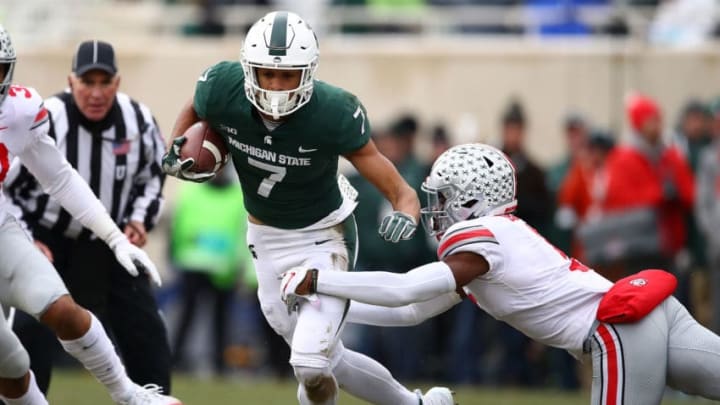
Reason against success: Offensive staff uncertainty
After a very disappointing season for the Michigan State offense in 2018, many thought that Mark Dantonio would shake things up and hire a new offensive coordinator or at least one or two new assistants for the offensive side of the ball. However, he did shake up his offensive staff by not hiring or firing any offensive staff member but by reassigning them.
Fans and college football analysts were not thrilled or impressed by the news.
The biggest news was the promotion of Brad Salem who was previously the quarterbacks coach to offensive coordinator where he will also be the running backs coach. Dave Warner, who was previously the co-offensive coordinator in charge of the play-calling, was demoted to quarterbacks coach.
Jim Bollman also took a demotion from being the co-offensive coordinator to offensive line coach. The Spartans will not have offensive co-coordinators as they did in 2018 as the play-calling responsibilities go solely to Salem.
There were also some minor staff reassignments on the offensive side of the ball with Mark Staten who held the title of assistant head coach and offensive line coach in 2018 is now the special teams coordinator and tight ends coach.
Terrence Samuel who was the wide receivers coach last year now doesn’t coach on the offensive side of the ball at all because he is now coaching the defensive backs with Paul Haynes. Now that Samuels is coaching the secondary, Don Treadwell who was a freshman coach last season is now in charge of the wide receivers.
As the old saying goes, you can shuffle a stack of cards put it doesn’t determine the outcome of the hand you are dealt. In other words, there is no guarantee that the Spartan play-calling and will drastically improve the offensive output.
Dantonio has gone on record alluding to the fact that he puts a high priority on loyalty. Big-name programs such as Alabama and Oklahoma have no issue replacing coordinators and assistant coaches on their staff who they feel are under-performing. Dantonio is taking a risk here and risking tarnishing his highly-admired legacy at Michigan State if the Spartans fail to win games due to lack of productivity.
Salem can be an offensive play-calling genius, Warner could get Brian Lewerke back to his 2017 playing form and Bollman can use his wisdom and experience to make the offensive line one of the best in the Big Ten. However, there are more pessimists than optimists among the green and white faithful that the offensive staff is putting together a totally revamped offense that will get the offense averaging over 28 points a game.
To put the lack of offensive productive in 2018 in perspective, if Michigan State scored just 10 points at Nebraska and in their bowl game against Oregon, they win both of those games and end the season at 9-4 as opposed to 7-6. If they scored at least 17 points at Arizona State as well, their record would have improved to 10-3 as it was the previous season in 2017.
The only team in 2018 to score 30 or more points on the Spartans was Utah State in the season-opener and Michigan State won that game. Ohio State was second in points scored against the Spartans with 26 points last year.
All of this meaning that if Michigan State can average between 24-28 points per game in 2019, it has a legit chance to be 11-1 at the end of the regular season.
The Michigan State offense needs to evolve and it can do that without compromising core principles on offense. Dantonio and his staff are being secretive of the offensive changes but no matter what different looks, formations and play-calls are shown, only one thing matters: Can the Spartans get into the end zone at least three times a game as well as a field goal or two and maybe on occasion a defensive or special teams touchdown?
